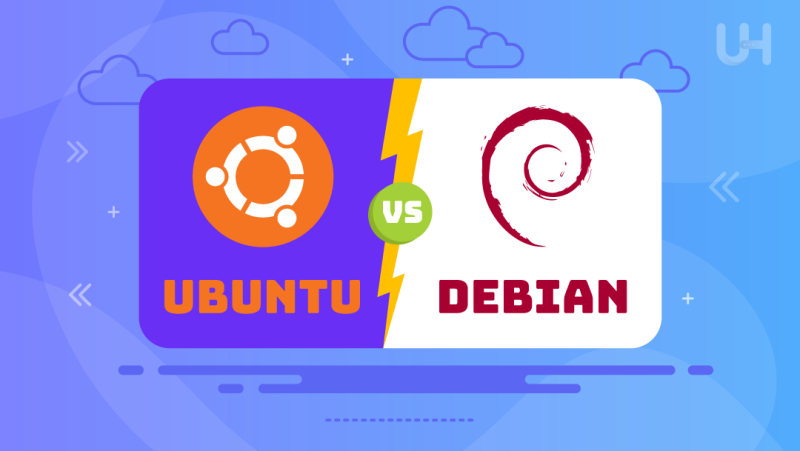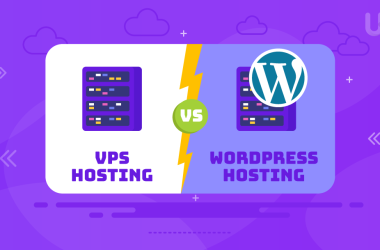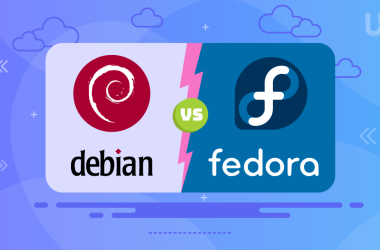It can sometimes be overwhelming when choosing between the two most popular Linux distributions in the world: Ubuntu vs Debian. One must admit that both have their strengths and are user-oriented, from novices to experienced sysadmins.
Whether setting up a personal project, a business website, or even a server for your VPS hosting, your choice between Ubuntu and Debian affects how your setup is going. Let’s delve into some things that make each of these distros unique and, as such, help you figure out which one would be right for you.
Ubuntu’s User-Friendly Experience
Ubuntu is also considered highly attractive to users and very usable. It is the perfect starting point for any Linux or Unix newbie. Ubuntu brings routine updates and a release schedule that may be predictable for any individual interested in new features and improvements without manual upgrading. This, in turn, makes it great for a dedicated server, in which stability and updated software are both crucial.
Also, Ubuntu has an excellent community support system, with a large number of active users and contributors, whereby help can easily be found in forums, tutorials, and documentation. This does help a lot—particularly if you are managing a server and need to get something fixed pretty quickly.
Debian’s Stability and Robustness

On the other hand, Debian is well known for being very stable and robust. It’s frequently the pick for those who want a rock-solid and stable system not crashing out at an unexpected moment. Debian releases are rarer, but since its cycle is slower, each release gets put through its paces. This can be particularly advantageous to a shared webhosting environment in which uptime and reliability are paramount.
Another of its strengths is its package management system, which enables a sizable software repository. This repository contains a wide range of software and tools, ensuring minimal inconveniences when one wants to install or upgrade an application. For users who wish to control and are willing to trade a bit of convenience for reliability, Debian is a strong contender.
Security Features in Ubuntu and Debian
When it comes to server management, security is a top priority. While Debian vs Ubuntu offers robust security features, their approaches to updates vary. Ubuntu has a dedicated security team that ensures improvements, updates, and patches are made regularly. This becomes crucial when handling sensitive data is expected and massive security standards must be maintained.
Setting up different types of SSL certificates on the server for encrypting data becomes very easy within Ubuntu and Debian before communication between the server and clients. However, Ubuntu’s more frequent updates can mean quicker access to the latest security features and fixes, which can be a significant factor in your decision.
Get Ultimate High-Performance Hosting For Ubuntu!
UltaHost Ubuntu VPS solution is an ideal option for hosting your website, providing the highest level of control and customization. Keep your servers running quickly, steadily, and with guaranteed uptime!
Debian’s Security Model
Debian has a stable and rigorous test model for security. Updates could be less frequent, but they’re exceptionally well-tested for any new introduction of bugs. Especially on a dedicated server type that doesn’t require many reboots, how Debian approaches this area can be very appealing.
While setting up an SSL certificate is well documented on Debian and supported, this assures secure communication between your server and users. Both systems provide robust security, but you might prefer frequent updates or a conservative approach focusing more on stability.
Choosing the Right Environment for Your Server
Another factor to remember is the environment in which you will deploy your server. If you know the pros and cons of VPS Hosting and you are for VPS hosting, ease of use and speed for provision could be needed, which Ubuntu offers. Many VPS providers can ensure these one-click installs for Ubuntu, so it’s relatively easy.
Due to the enormous documentation and support provided by the community, you can easily find the answers to most questions. This saves a lot of your time and effort, mainly if you are a VPS newbie. Ubuntu is so popular that many re-configured solutions and scripts exist for this given time, which simplifies server management.
Debian’s Strength in Long-Term Stability
Slightly more involved setup-wise, Debian is superb for environments where long-term stability is an issue. The system’s minimal nature can help you maintain a leaner, more custom-aligned system. This means that you can choose to install only the necessary components, reducing the system’s footprint and potentially improving performance.
This can be particularly good if you’re running a dedicated server and strive for maximal performance with minimal overhead. Notably renowned for its reliability, Debian is a favored, reliable way for many business enterprises and high-level users. The learning curve might be steeper, but stability and complete control are rewarding for critical application management or deployments on a larger scale.
Performance Considerations for Ubuntu and Debian
Performance is another crucial factor. The efficiency parameters of Ubuntu and Debian are equally efficient but vary only slightly between them. Ubuntu, in its stock form, tends to be more resource-intensive because it comes with many features and services pre-installed, which can be advantageous if you prefer a system with less setup required.
Debian’s lightweight footprint is a real advantage for a dedicated server or a VPS hosting environment where each bit of performance matters. Debian will enable you to implement a minimal installation and equip it with only the necessary and optimal components for proper performance.
Ubuntu’s Appeal for Beginners
The choice between Ubuntu and Debian also comes down to the subjective side—personal preference, which fits the project’s requirements more. For instance, Ubuntu’s elegantly polished interface with all-important user-friendly tools is apt for beginners or those who would like a hassle-free setup, making it ideal for personal projects or small business websites.
Its strong community and regular updates ensure you’re always on the cutting edge. On the other hand, for things like setting up a dedicated server or a fastest server environment, Ubuntu’s ease of use helps to save hours and diminish complexity. If you value a smooth, streamlined experience with plenty of available support options, Ubuntu is hard to beat.
Debian’s Advantage for Advanced Users
Debian’s stability and control attract users. It’s a favorite among those who need a reliable system that won’t change unexpectedly. Debian releases are rarer, but since its cycle is slower, each one is put through its paces, ensuring high stability.
This makes Debian an excellent candidate for environments where high availability is a must, such as web hosting running essential applications. With an extensive repository of packages and good security, Debian is a helpful tool for advanced users. If you’re comfortable with a bit more complexity and appreciate the peace of mind that comes with a meticulously tested system, Debian might be the better choice.
Conclusion
Ubuntu and Debian have unique strengths and are suited to different types of users and applications. If you’re new to Linux or need a user-friendly environment with lots of support, Ubuntu is a fantastic choice between Debian or Ubuntu. Due to its ease of use, regular updates, and strong community, it’s great for various uses, from simple personal projects to professional server management.
On the other hand, if you want a stable, controllable, and long-term reliable distribution, Debian is a good choice. Its rigorous testing and minimalism give users a stable and efficient system—just right for dedicated servers and critical applications.
Experience the ultimate high-performance and advanced hosting system. With all of UltaHost’s CloudLinux VPS plans, you can get root or administrator access, and with only a click, you can upgrade your resources anytime.
FAQ
Which of the two, Ubuntu vs Debian, is better in VPS hosting?
It will suit VPS hosting, whether Ubuntu or Debian. One shines in user-friendliness and quick setup, while the other offers stability and reliability in the long term.
How do Ubuntu and Debian install SSL certificates?
Ubuntu and Debian have SSL certificate support, and it’s pretty easy to install. Ubuntu frequently updates new security features, while Debian’s testing process will ensure stable releases.
Can Ubuntu and Debian be used for a dedicated Server Installation?
Yes, both are popular choices for dedicated servers. Ubuntu offers friendly tools and broad community support, whereas Debian is very good at stability and control.
Which is easier for a beginner, Ubuntu or Debian?
Ubuntu is polished with its interface, piles of documentation, and user-friendly tools for beginners. Debian’s sometimes implies a steeper learning curve but offers vast control and stability.
What are some considerations to use between Ubuntu vs. Debian?
Ubuntu for ease of use and regular updates; Debian if you desire stability, reliability, and control. Indeed, it may also depend on the specific features that a given project could require.








